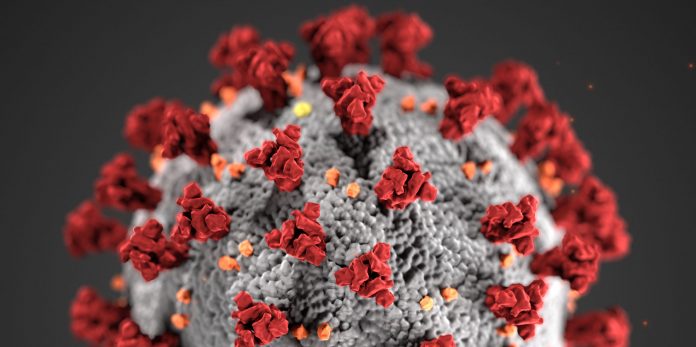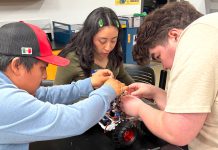MONTEREY COUNTY — Representatives from Monterey County’s hospitals reflected on the one-year anniversary of the Covid-19 pandemic and the many impacts felt locally during last week’s press briefing.
“This past year has been very challenging for Monterey County residents,” said Dr. Edward Moreno, the county’s health officer, at the March 17 briefing. “The last 12 months have been very challenging for our public health staff as well.”
Moreno went on to credit the many county employees who helped serve in emergency roles during the pandemic.
“Many of our employees had trained to respond to pandemics and they stepped up immediately to respond,” he said. “Some of our other employees in other programs were aware they could be called on to respond to disasters and pandemics and they also stepped up to respond.”
Moreno noted the decreasing positivity rates, which represent fewer infections in the county.
“Because of that, we’re now in the Red Tier and there’s fewer restrictions on restaurants with indoor dining,” Moreno said.
He also explained the new tier means easing of restrictions on retail stores, shopping centers, gyms, movie theaters, zoos, museums, aquariums and schools.
“People may be wondering how and when we’ll move to the Orange Tier and how we move into Orange Tier,” said Moreno, explaining that it would rely on the community continuing to observe health guidelines. “We would need to be in the Red Tier at least three weeks before moving into the Orange Tier.”
Moreno also urged people to get tested if they believe they have Covid-19 symptoms, even if they’ve already had Covid-19 or have been immunized.
“The good news is that at least 100,000 doses of Covid vaccine have been administered in Monterey County,” he said, “and also 23% of Monterey County residents have been vaccinated.”
Among the representatives from the area’s four hospitals at last week’s briefing was Dr. Joshua Deutsch, who spoke on behalf of Mee Memorial Healthcare System in King City. His comments focused on the impacts on local residents in South Monterey County.
“From the community’s standpoint in South County, a lot of people lost lives and members of their family,” Deutsch said. “There’s a lot of long-term morbidity, people who have never fully recovered after getting coronavirus.”
Deutsch explained the economic toll was substantial, including lost jobs, increased food insecurity, a lost year of school for youth and fewer family resources to compensate for losses.
“I have many students who went from A and B students to literally failing all of their classes,” Deutsch said.
Though he is a medical practitioner, Deutsch said he chose to help students with educational plans to assist them with getting back on track. He went on to speak about the mental health crisis he observed.
“I’ve had a lot of families who have been afraid to leave the house, some of them over-interpreted the shelter-in-place and felt like it was unsafe for them to go outside, many people in small apartments who are afraid to let their kids outside,” Deutsch said. “Children who have not had anyone to interact with their age in a year.”
Concerning the mental health struggle, Deutsch said he dealt with teens who were failing all their classes and considering suicide because of the stress of health restrictions and being sheltered in place with no outside contact. He realized human contact would be the best cure, to get the teens to interact with friends.
“I had to make a medical decision whether it was advisable to break state recommendations,” he said.
Deutsch explained that in a number of such situations, he determined it was enough of a mental health emergency to advise his patients get outside contact with friends, and that he had to make such medical evaluations on a case-by-case basis multiple times.
He also went over the logistics, saying Mee Memorial didn’t run out of personal protective equipment during the crisis.
“When vaccinations came, we dedicated a ton of our administrative resources to having a robust vaccination program for South County,” Deutsch said. “We didn’t get left behind as the victims of the health care disparity, which tends to affect poor people, people of color and people in rural regions the most. We didn’t want our people on the bottom end of that. We wanted our people on the winning side of getting vaccinations.”
He estimated that Mee Memorial had vaccinated a total of 4,000 people as of last week. He said clinic staff are available either over the phone or in person to help those in need of assistance in getting a vaccination appointment, since the county’s online system has proven difficult for segments of the population.
Deutsch also explained Mee Memorial had no outbreaks within the clinic.
“We did a very good job of making our clinic safe so that our community could continue to get the health care that they need during this crisis,” he said.
Though Mee Memorial survived economically, Deutsch noted the hospital had to close down the obstetrics and intensive care units.
“We survived, and survival for small community hospitals is always something that is a struggle in the current health care industry,” he said. “Our ability to stay open and help serve our community, even with the challenges, I think was a major accomplishment for us.”
Deutsch said he was hopeful that the region could move forward and not backwards in ending the pandemic.
“I have no nostalgic feelings of the last year of shelter-in-place,” he said. “This was not a quaint time in history. This was really a devastating time in our community. I’d like to think that our hospital was able to at least support people in their time of need.”














